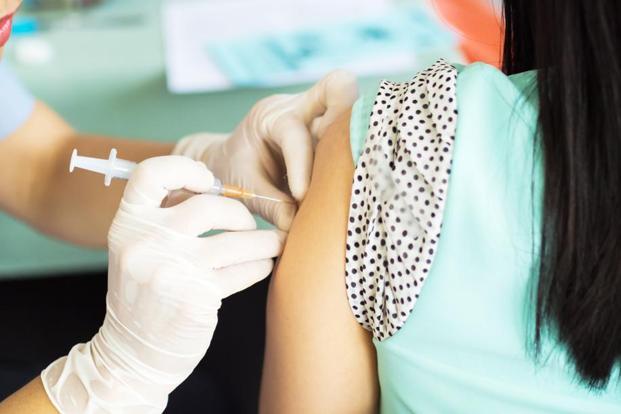Vaccines taken during childhood don’t provide lifetime protection against diseases. That is why adult vaccination is important
On 14 May 1796, English physician Edward Jenner did a ground-breaking experiment. He injected a child with a biological preparation from a cowpox lesion to see if it would confer immunity against small pox. The child did not get small pox on subsequent exposure to the disease. Jenner concluded, after more such similar experiments, that he had developed a new method to prevent small pox. He called this method of preventing disease “vaccination”.
Vaccines are biological preparations that contain killed or weakened forms of disease-causing microbes or their proteins. Once a person is inoculated with a vaccine, the body mounts an immune response as if it were exposed to the disease-causing microbe. This results in the body producing antibodies and immune cells that then provide immunity to that disease.
There are more than 22 vaccines available today, and many of them are given in infancy to provide protection against diseases through childhood. Public health data, however, shows that some of these vaccines do not protect against diseases throughout a person’s lifetime.
This perhaps explains why diseases that could be prevented during childhood with the help of vaccination are emerging in adulthood. According to a 2011 newsletter of the National Centre for Disease Control (NCDC), there have been outbreaks of measles, mumps and rubella on college campuses and at workplaces in both developed and developing countries.
While data on the number of Indian adults suffering from, and succumbing to, vaccine-preventable diseases isn’t available, Vasant Nagvekar, infectious disease specialist at the Lilavati Hospital and Research Centre in Mumbai, writes in an email that vaccine-preventable diseases like influenza and pneumonia kill 100 times more adults than children in India every year. This happens despite the fact that adult vaccines for these diseases are available. These vaccines can significantly reduce the number of people suffering and dying from diseases like influenza, pneumonia, tetanus and hepatitis.
The rate of adult vaccination, however, is low in India. Atul Biniwale, a physician in Pune, cites two reasons: “It is assumed that in India, adults are exposed to diseases in their environment and thus they build immunity naturally. This assumption doesn’t hold true. Second, people are generally hesitant to vaccinate their children or themselves. They are reluctant to engage in preventive health measures. This could be owing to economic reasons, or the fact that many doctors themselves aren’t aware of the value of adult vaccines and so don’t recommend them to their patients.”
Don’t give in to the myth, however, that a person will be protected against most diseases if he or she is in good health and maintains good hygiene. Though good hygiene does protect against some infections, others can spread regardless of how clean one is.
The World Health Organization’s scientific advisory group of experts’ global programme for vaccines and immunization recommends adult immunization as part of routine immunization services. Both Dr Biniwale and Dr Nagvekar agree. “Adult vaccinations must become a fundamental part of routine patient care,” says Dr Nagvekar.
Some people might have concerns about safety and adverse allergic reactions. A booklet on vaccine safety by the US’ Centers for Disease Control and Prevention (CDC), says, that a life-threatening allergic reaction to vaccines occurs in one in a million cases.
Earlier this year, the CDC published a chart of recommended adult immunization, depending on age. Swati Bhave, senior consultant in adolescent paediatrics at the Jehangir Hospital in Pune, and Dr Nagvekar have their own list (see “Recommended vaccines for adults”). Do consult your physician, however, about the vaccines that would be suitable for you.
Sujata Kelkar Shetty, PhD, is a wellness consultant, life coach, and a clinical scientist trained at the National Institutes of Health in Bethesda, US.
Recommended vaccines for adults
For those above 21
Influenza: Influenza, or flu, is the most common illness experienced by adults. According to the World Health Organization, the flu kills 300,000-500,000 people worldwide every year. Most flu vaccines offer immunity against three of the most prevalent flu strains circulating in a flu season. An annual vaccine is the best way to reduce the chances of getting flu.
Tetanus: Since 1983, all pregnant women in India are given two doses of the tetanus vaccine, as part of the nationwide immunization policy, to prevent infection in the mother and her newborn baby. According to the National Centre for Disease Control, tetanus causes nearly 309,000 deaths worldwide every year.
Swati Bhave, senior consultant in adolescent paediatrics at the Jehangir Hospital in Pune, says there are two vaccines for tetanus—Td and Tdap—and various schedules for adults to take them, depending on whether the person has taken the DPT vaccine in childhood and/or booster doses in adolescence. The Tdap vaccine confers simultaneous protection against tetanus, diptheria and pertussis, while the Td vaccine is only for tetanus and diphtheria.
Hepatitis B: The hepatitis B infection is responsible for a variety of liver diseases, including acute hepatitis or jaundice, as we know it. In India, more than 200,000 deaths related to chronic hepatitis occur annually. The WHO recommends its inclusion in routine immunization of adults. Dr Bhave says: “You can get infected with the Hepatitis B virus through the exchange of bodily fluids. It’s best for everyone to be vaccinated (once in adulthood) as a precautionary measure.”
Hepatitis A: Many Indians from the lower socioeconomic strata get exposed to the Hepatitis A virus through unhygienic surroundings and unsafe drinking water, develop antibodies and are, therefore, protected from the disease. But those from a higher socioeconomic status, who tend to have access to clean drinking water, may not develop antibodies.
To be sure, you can always get your antibody titer checked through a blood test. An antibody titer allows the doctor to determine if you have developed immunity to the Hepatitis A virus. If you have, then there’s no need to get vaccinated. If, however, the test shows that you don’t have immunity, then it’s best to get vaccinated.
Human Papillomavirus (HPV): The HPV vaccine helps prevent cervical cancer, male genital cancer and oral cancer. Cervical cancer is one of the most common cancers among Indian women. There are two vaccines available currently: the quadrivalent, which immunizes against four types of HPVs, and the bivalent, which immunizes against two types.
“There is a new vaccine available only in the US that immunizes against nine types of HPVs. This provides the best protection,” says Dr Bhave.
The primary dose of these vaccines should be taken before one becomes sexually active—the recommended age is 11-12 for all girls and boys. If not then, a dose can be taken any time till the age of 26. After that, it is believed that most adults would already have been exposed to the HPV viral
strains, and the vaccine will be unable to confer 100% immunity. Annual screening for cervical cancer, however, must continue irrespective of whether you are inoculated against HPV or not.
Typhoid: Typhoid is a fairly common disease in India and one that is not to be taken lightly. It affects 21 million people worldwide every year, killing about 200,000. There are two typhoid vaccines—one is oral and the other injectable. Vasant Nagvekar, infectious disease specialist at the Lilavati Hospital and Research Centre in Mumbai, recommends that all adults should take this vaccine.
For those above 60
Herpes zoster: Adults who got chicken pox as children are at risk of getting herpes, or shingles, and a third of those who get shingles are likely to develop serious complications like chronic pain. Sometimes, patients are never able to resume normal activity, and become depressed and reclusive owing to long-term pain and disability. The risk of complications associated with shingles increases with age as the body’s immunity diminishes. Hence, all adults over 60 should be vaccinated against herpes.
Pneumococcal vaccine: The pneumococcal vaccine protects against pneumococcal pneumonia, bacteraemia (presence of bacteria in the blood) and meningitis, all of which have fairly high fatality rates in India. Since an ageing population is particularly susceptible, Dr Nagvekar recommends this vaccine for senior citizens.


